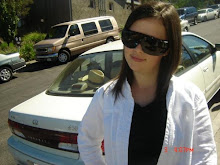Here, from Jay Dobyns, the first federal agent to infiltrate the inner circle of the outlaw Hells Angels Motorcycle Club, is the inside story of the 21-month-long operation that almost cost him his family, his sanity, and his life.
Summary taken from the paperback back cover. It's pretty succinct, eh?
Okay, I want to get the bad out of the way because I have plenty of good things to say.
I usually don't despair when I read non-fiction books about bad people/things... it's generally an interesting topic and I can be a bit objective. But for some reason, this one got to me. I felt bogged down in the bad things that happen in this world -- a hand signal for gangbangs, a woman murdered for insulting someone in a clubhouse, so many people using/addicted to crystal meth. It just got to me. Not to sound naive, but there is just so much more to life, you know?
Also, I didn't get through this one as quickly as I usually do. It was good and interesting, but because it was taking longer to read, I felt frustrated and as if I didn't like it as much as I did.
And onto the good!
While reading, you become completely immersed in this world, which is pretty incredible. Not everyone can write that effectively. And I came away with all this knowledge that I never thought I would have:
people use the abbreviation "OMG" for "outlaw motorcycle gang" (tee hee)
it is, in fact, "Hells Angels" and not "Hell's Angels" (apparently there's more than one hell based on where you are)
they also say 81 (eight one, not eighty-one) to refer to the Hells Angels (8 for H [the eighth letter in the alphabet] and 1 for A [the first letter in the alphabet])
I love finding a Detroit connection, and this book has a great one. When describing Slats, aka Joe Slatella, who ran Operation Black Biscuit:
"He'd worked in Detroit in the eighties and nineties -- the Vietnam of federal law enforcement..."
Wowza, right? Also, Slats named it "Operation Black Biscuit" because he's a huge Detroit Red Wings fan, and "black biscuit" is slang for hockey puck. (This was new to me -- I've never heard that, and my parents said that they hadn't either. But we're none of us huge hockey fans.)
This is possibly the best quote from a rough-and-tumble undercover ATF agent ever:
"October 5. On the way to the Patch, I stopped at a Starbucks. They already had the Halloween seasonal, a pumpkin-flavored latte with brown sugar cinnamon sprinkles. I love the seasonals at Starbucks -- I get them with extra foam and low-fat milk. Totally lame, but there you go."
Ooh, and get a load of this quote on the back cover:
"Fuhgedaboudit! Moving and frightening ... The most informative and authoritative book on undercover work since Donnie Brasco."
--Joe Pistone, aka Donnie Brasco, and author of the New York Times bestseller Donnie Brasco: My Undercover Life in the Mafia
Tee hee! That kind of quote takes balls, and I love that they put it on the back cover. I read Donnie Brasco forever ago, but I don't remember enough of it to compare to No Angel.
And those of you who enjoy the movie Hot Fuzz will understand that I'm completely paranoid that this post has "angle" instead of "angel" somewhere in it. And that's a mistake that spell-check isn't going to find! But in all seriousness, this book is pretty amazing. I recommend checking it out if you're interested in undercover work or motorcycle gangs or just want an incredible peek into a world that's completely different from your own.



















